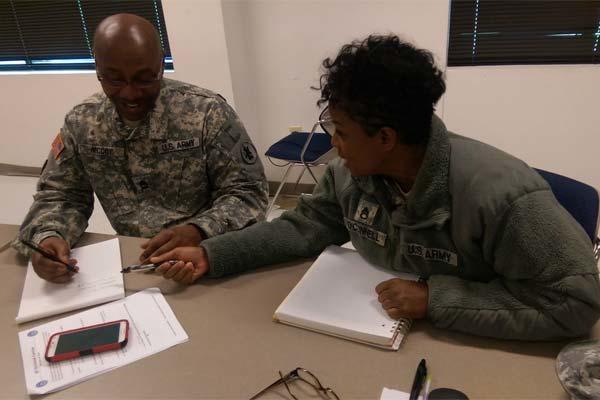U.S. Army sergeants are learning they may have to spend as much time honing their writing skills as they do practicing their marksmanship skills if they want to get promoted under the service's new Non-Commissioned Officer education system.
Army Training and Doctrine Command officials are placing strong emphasis on writing at every level of NCO 2020, the Army's new Non-Commissioned Officer Professional Development System.
"NCO 2020 is our way of preparing the NCO corps for the challenges for that uncertain future," Command Sgt. Maj. David Davenport, of Army Training and Doctrine Command, said at a June 22 roundtable discussion at the Pentagon.
"We just finished up a pilot in all our basic leadership courses," Davenport said. "Beginning fiscal year 2018, it will be a requirement to have your writing assessment done ... prior to coming to the classroom."
Soldiers will go to a website and will be given a topic to write a five-paragraph essay about, Davenport said.
"Once they have finished, they upload and in a matter of minutes it comes back with -- you need to work on your spelling, your grammar-sentence structure, the body, the flow and it really kind of prints out an after-action report of things that you need to focus on to improve," he said.
Army officials are encouraging soldiers to then use tuition assistance to take courses such as English composition to improve their writing, Davenport said.
The massive overhaul began last fall when the service renamed the Non-Commissioned Officer Education System to the Non-Commissioned Officer Professional Development System.
The effort is the result of one of the most extensive polling efforts in the service's history. The online NCO 2020 survey gathered responses from 400,000 soldiers on the current education system.
One of the biggest changes to come out of the effort is a new policy known as STEP for Select, Train, Educate and Promote.
The policy went into effect Jan. 1 and is the "new way we are going to make sure soldiers, NCOs, have certified in their core competencies for promotion," Davenport said.
Last year, the Army had backlog of about 14,000 NCOs who had been promoted to various grades in the intelligence corps but had not received formal military education, Davenport said.
"We have cut that down to a little over 8,000 in the backlog," he said.
Davenport, along with representatives from the Combined Arms Center, Army Sergeants Major Academy, the Institute for Noncommissioned Officer Professional Development and the Training Operations Management Activity, will host the TRADOC town hall, Thursday, June 23, at 5 p.m. Eastern Standard Time to discuss changes to the NCO Professional Development System.
The first town hall, streamed live March 3, 2016, focused on the state of NCO Development. Subject matter experts answered questions from the live-stream chat board and TRADOC social media platforms.
Davenport admitted it did not go as well as he had hoped.
"In the first town-hall, I made the assumption that everybody had read the NCO 2020 strategy," Davenport said. "They really had not read it; we were all over the place" in terms of questions.
With this upcoming town-hall meeting, "I have tried to limit to line of effort 1, which is leader development," Davenport said.
The chat board will open at 4 p.m., one hour before the live-streamed panel begins. Participants can watch and ask questions atwww.emc.army.mil/broadcast.
"In the last town-hall that we did, we reached over one million social media accounts, we had on average over 3,000 soldiers in the two chat rooms and we were in 18 different countries," Davenport said.
"And that was two hours of work. It’s a very effective way to communicate directly to a wide range of audience. But it is communication; it's two-way -- they can hear what I am saying, they can chew on it, think about it and respond back. And whether it is me or the subject-matter experts in the room, we are listening to them."
-- Matthew Cox can be reached at matthew.cox@military.com.




























